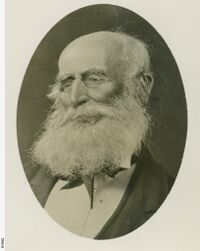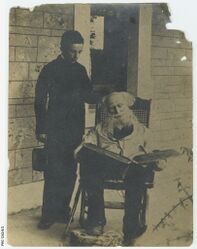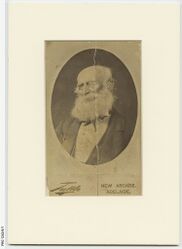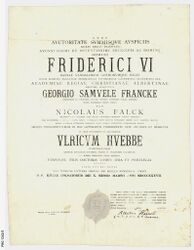Ulrich Hübbe (1805-1892)
Ulrich Hübbe LL.D. (1 June 1805[1] – 9 February 1892) was a German immigrant to South Australia, remembered for his part in framing the Real Property Act, which led to the Torrens title system of land registration.
Ulrich Hübbe | |
|---|---|
Ulrich Hübbe [SLSA B-9042] | |
| Born | 1 June 1805 Hamburg |
| Died | 8 February 1892 Mount Barker, South Australia |
| Nationality |
|
Biography
Original text by Wikipedia Editors, particularly Doug butler, and made available under the Creative Commons Attribution-ShareAlike License 3.0. Edited by Benjamin Hollister and made available under the same license.
In Germany
Dr. Hübbe was born in Hamburg in 1805, the third son of Heinrich Hübbe (1771–1847), and was educated at the Johanneum Gymnasium before studying law at Jena, Berlin, and the University of Kiel[1], where he was awarded his LL.D.
In Australia
He arrived in South Australia aboard the Taglioni, 350 tons, from London in October 1842, and for a time worked for the South Australian Register before being involved as a land agent.[2]
The system of land title deeds which existed from the foundation of South Australia, as inherited from the Britain, was complex, open to abuse and disliked by both land agents and landowners, and seemed to have few supporters apart from traditionalists and lawyers. Suggestions for centralized registration of property were made in the earliest days after Proclamation by such as James Hurtle Fisher. Dr. Hübbe, who had personal experience with both the German system and the British, was one among many who wrote to the papers suggesting reform, but it was not until R. R. Torrens submitted his "Real Property Act" to the House of Assembly that any substantial effort towards reform was made.[3]
Hübbe, who was away from Adelaide around this time, returned in 1856 to find Torrens's campaign in full swing, and wrote, as "Sincerus", to The Register supporting the Act and making light of the difficulties in its implementation.[4] Torrens, who was under siege from some powerful interests, sought out Hübbe as an ally, no doubt with an eye to enlisting the support of the equally powerful German community. In support of Torrens's campaign, Hübbe wrote a booklet The Voice of Reason and History on Conveyancing, drawing on his knowledge of European law, particularly that inherited from Hanseatic League States, but also of France. The cost of printing and publishing was met by George Fife Angas|G. F. Angas.
Responding to commentators who claimed he was the unacknowledged father of the Real Property Act, Hübbe wrote:
... I modestly disclaim as a matter of fact the honour of having originated that Act, ... (although) I drew attention to the very objectionable features of the English mode of conveyancing, and to the honest, unsophisticated mode of transfer practised in Germany. ... The facts pointed out and the ideas thus kindled in the minds of clear-sighted, practical men, who were afterwards seen in the front rank of the contest, were no doubt farther circulated, ... Torrens first laid down his scheme of legal reform, formed his private committee; and prepared the public mind for the contemplated change by a series of telling articles in the public journals. Of all this I knew nothing, nor was I at that period known to Mr. Torrens; and on returning to Adelaide in 1856 I was perfectly surprised on finding the reform campaign in full operation, and the papers bristling with leading articles and letters on the subject, and the men of law on the heights of indignation — not then from any great apprehension of danger, but at the unprecedented boldness and comprehensiveness of Torrens' assault. Well may you say that his is a "master-mind." He perfectly understood the situation. He brought, besides his own intellectual powers, tact, and brilliant eloquence, the landowners, large and small, the commercial men. the tradesmen, and the intelligence of the South Australian people as a whole, to bear on the subject all at once, so as almost to overwhelm the opponents of reform. Perceiving, however, that he was likely to be outflanked by adroit opponents on some intricate points of permanent consequence both in the foundation and practical working of the new system, I ran, unasked by Mr. Torrens and unknown to him, into the breach. My letters signed ' Sincerus ' arrested Mr. Torrens' attention directly. He came to look for me in my humble abode in Freeman-street, and we have ever since been firmly allied. I and other Germans, led on by Beyer, Vosz, and many others, gave him what ever assistance we were able to contribute; and he, finding me well up in the judicial and historical aspects of the matter, encouraged me to write ' The Voice of Reason and History on Conveyancing' (not yet wholly forgotten), and he got Mr. G. F. Angas, in his own generous way, to bear the whole costs of publishing. I also lent Mr. Torrens some amount of industrious and persevering aid in privately discussing the principles of his first scheme, and I had a share — a very humble share — in re-settling the draft of the first Act before its second reading. I claim, therefore, no more than a share in this useful work, in which I have been — and am proud that I have been— an aider and abettor; but, as you will now see, I have not been its originator. ... it were unjust to Sir Robert Torrens to withhold a single leaf of the crown of laurel which belongs to him, and to him alone, as the originator of his great Act. But if, under present circumstances (he being absent), my fellow-colonists will allow me to advise them they will find me a thoroughly sound and expert, as well as firm, defender of the Act. Yours, &c., ULRICH HUBBE. L.L.D. [sic][5]
Ulrich and his wife lived with their teacher daughter Isabella from around 1875; at Spalding, then at White Hut. He was a deeply religious man of the Lutheran faith, and was blind for many years before his death, but having taught himself to read Moon type (an alternative to Braille) was able to console himself by reading the Gospels and Psalms.[2] In the House of Assembly, in September 1884, E. W. Hawker moved, seconded by J. L. Stirling, that Hübbe be granted £200[6][7] in recognition of his contribution, given gratuitously, to Torrens's Act.[8] One commentator called him "one of the most unselfish, un-businesslike, and gentle creatures that ever lived", and hoped that he would be better appreciated in an after-life.[9]
Family
Ulrich Hübbe married Martha Gray ( – 29 July 1885) in 1847.
- Martha Mary Hübbe (1 August 1848 – 27 January 1881) married John Hood (c. 1839 – 15 May 1924) in 1871. Both worked at Townsend Duryea's photographic studio.
- Samuel Grau "Sam" Hübbe (1 August 1848 – c. 15 October 1900) married Edith Agnes Cook (1859 – 2 April 1942) on 3 January 1885. He was Inspector of Vermin, then the first commissioned officer to be killed in the Boer War.
- Dr. Edith Ulrica "Rica" Hübbe (1885–1967), was a student at Advanced School for Girls
- Janet Doris Hübbe (1887 – 17 December 1950) married Alfred Allen Simpson (15 April 1875 – 27 November 1939) on 6 January 1910.
- Sgt. Max Ulrich Hübbe (28 May 1891 – ) of 1st AIF, then farmer at Woodenup, near Kojonup, Western Australia
- (Harriet) Marjorie Hübbe (1893 – 1993) married Alfred Beech Caw ( – 1966) on 22 February 1922, farmed at Woodenup, Western Australia.
- Capt.(Hermann) Fritz Hübbe (1895 – 28 July 1916) of 1st AIF, killed in action, France.
- Catharine Elizabeth Hübbe (1851–1861)
- Isabella Christina Hübbe (c. January 1854 – 18 October 1946) was a teacher at Spalding from 1877, and White Hut from 1880, married Francis Coleman May (1855 – 26 February 1923) in 1889, lived at "Uplands", Mount Barker, South Australia, moved to Mullewa, Western Australia in 1908.
<--Friedrich and Rudolphine had four children:
| Name | Birth | Death | Spouse |
-->
Residences in the City
| Dates | Place | Current Address | Co-ordinates |
|---|---|---|---|
Work in the City
| Dates | Place | Current Address | Co-ordinates |
|---|---|---|---|
Published Obituary
From the Evening Journal (Adelaide), Wednesday 10 February 1892:
" Obituary.
DEATH OF DR. ULRICH HUBBE. — News reached us on Tuesday evening of the death of Mr. Ulrich Hübbe, LL.D., which occurred that day at the residence of his son-in-law, Mr F. C. May, Mount Barker. Of the old colonists now left all will remember the deceased gentleman and the part he played in the construction of the Real Property Act. Dr. Hubbe was born at Hamburg during the stirring episodes connected with the French military advances in Europe, the year of his birth, 1806, being that in which Napoleon's victorious army took possession of Hamburg. He remembered the evacuation of his native city in 1813 after the disaster to the French arms in Russia, and also the restoration of the independence of the city at the instance of the allies in May, 1814. It is nearly fifty years since Dr. Hübbe came to Australia. Shortly after his arrival he became connected with the S.A. Register reporting staff. Relinquishing that position some years later, he started business as a land agent. At that time he assisted the late Sir R. R. Torrens to draft that famous measure the merits of which have been so universally recognised by lawyers and land administrators. Dr. Hübbe explained to Sir R. R. Torrens the form of certificates of title and encumbrances in force m the Hanseatic towns of his native land, and Sir Robert was so much pleased with the simple way in which the charges were detailed that, with Dr. Hubbe's assistance, he transferred the idea as far as was practicable into the Bill. From this source in particular was embodied the principle that mortgages should not change the freehold property, but
that they should simply be charges on the property in priority one over the other. Dr. Hübbe, at his own suggestion, drew the very, comprehensive repeal clause printed in the Act, and also spent a considerable time in remodelling the whole draft of the Bill. He submitted his alterations to Sir R. R. Torrens, and the draft Bill thus revised was placed before Parliament and was made law. It is to be regretted that these important services were never properly recognised by the State. Mr. Hübbe was a frequent contributor to literature, dealing with a good many subjects, and he also took part in many public reforms. Since his retirement from business many years ago, the deceased gentleman spent a great deal of time in writing an epic poem descriptive of the progress of civilization in Germany in connection with free trade. He was an excellent classical, scholar, and had accumulated a vast amount of knowledge on a great variety of subjects. Mr. S. G. Hübbe, Inspector of Vermin Boards, is a son of the deceased.[10]
" -->
Photo gallery
References
- ↑ 1.0 1.1 David St Leger Kelly, 'Hübbe, Ulrich (1805–1892)', Australian Dictionary of Biography, National Centre of Biography, Australian National University, http://adb.anu.edu.au/biography/hubbe-ulrich-3808/text6041, published first in hardcopy 1972, accessed online 15 July 2016.
- ↑ 2.0 2.1 "The Late Dr. Ulrich Hübbe". The Mount Barker Courier and Onkaparinga and Gumeracha Advertiser. Vol. 12, no. 593. South Australia. 12 February 1892. p. 3. Retrieved 15 July 2016 – via National Library of Australia.
- ↑ "Views and Comments". The Advertiser (Adelaide). South Australia. 25 July 1925. p. 19. Retrieved 16 July 2016 – via National Library of Australia.
- ↑ "The Transfer of Real Property". South Australian Register. Vol. XXI, no. 3236. South Australia. 18 February 1857. p. 3. Retrieved 16 July 2016 – via National Library of Australia.
- ↑ "Open Column". The Bunyip. No. 474. South Australia. 17 April 1874. p. 3. Retrieved 15 July 2016 – via National Library of Australia. A fine letter by Hübbe to the Editor of the Gawler Bunyip.
- ↑ "PROCEEDINGS IN PARLIAMENT. THURSDAY, AUGUST 28". The South Australian Advertiser. Adelaide, South Australia. 29 August 1884. p. 5. Retrieved 6 August 2018 – via National Library of Australia.
- ↑ The Hansard figure. Other sources give £250 and £300. One correspondent claimed that an (unnamed) M.P. parlayed that sum into an annuity of £50 for life, which would have turned out to be quite generous as he lived another six or seven years.
- ↑ "Parliament". The Narracoorte Herald. Vol. IX, no. 701. South Australia. 19 September 1884. p. 3. Retrieved 16 July 2016 – via National Library of Australia.
- ↑ "Letter to the Editor". The Southern Cross (South Australia). Vol. III, no. 140. South Australia. 4 March 1892. p. 9. Retrieved 15 July 2016 – via National Library of Australia.
- ↑ "Obituary". Evening Journal. Vol. XXIV, , no. 6668. South Australia. 10 February 1892. p. 3 (SECOND EDITION). Retrieved 2 August 2023 – via National Library of Australia.
{{cite news}}: CS1 maint: extra punctuation (link)



